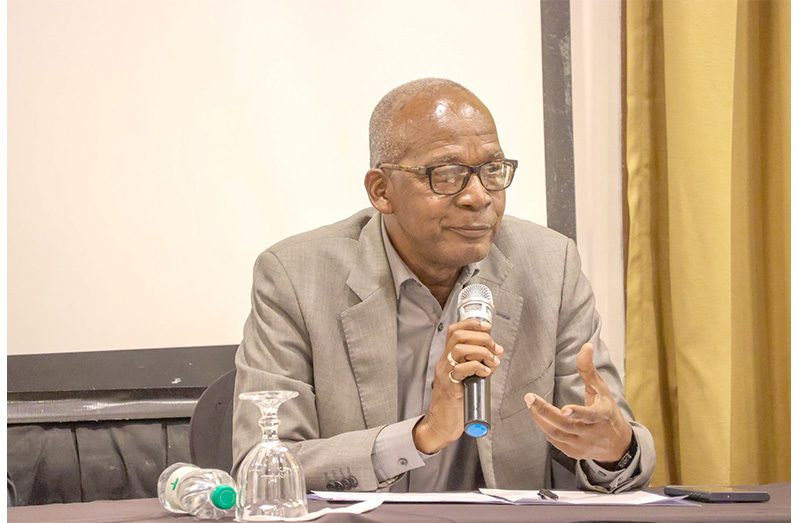MINISTER of Labour, Joseph Hamilton, on Thursday, chaired a high-level consultation meeting aimed at bringing together key labour stakeholders, trade union leaders and social partners to engage in open and solutions-driven dialogue on advancing Guyana’s labour sector.
Held at the Herdmanston Lodge, the meeting focused on strengthening collaboration among the tripartite partners, (government, employers, and workers), for the development of a more inclusive, safe, and sustainable working environment.
Key discussion points at the meeting included: Protection of workers’ rights and OSH; Training, skills development, and lifelong learning transitioning from informality to formal employment; Just transition in the face of technological advancement; Decent work in the platform economy and digitalisation; Financial literacy and co-investment opportunities for workers; and Coordinated Workers’ Day activities through tripartite collaboration.
According to the ministry, Minister Hamilton, during the opening ceremony, placed emphasis on the importance of extending the conversation beyond union leadership to include wider executive participation.
He stated, “We need a frank and fearless conversation about how we move forward as a tripartite body.” The minister continued, “Protecting the rights of workers goes far beyond wages and salaries- it’s about their safety, development and ability to participate in the country’s growth.”
Additionally, in highlighting the need for deeper stakeholder engagement, the labour minister announced plans to meet with the Private Sector Commission, regional chambers of commerce, and oil and gas companies across Guyana. These meetings will focus on enhancing representation and protections for workers, particularly in emerging industries.
Alongside this, the minister also advocated for collective agreements to be more holistic, addressing not only compensation but also worker development, safety, and long-term well-being.
Minister Hamilton reiterated the need for public-private partnerships in training and retraining initiatives to ensure workers remain competitive in an evolving economy.
The ministry noted that the meeting served as a foundation for actionable outcomes and is part of a series of consultations planned between the Ministry of Labour and key stakeholders. These discussions aim to share recommendations on how best to protect and empower workers across all sectors.
Meanwhile, the minister emphasised that the initiative was in alignment with the People’s Progressive Party Civic (PPP/C) Government’s enduring commitment to advancing safe working environments and upholding robust labour standards for all Guyanese.
Furthermore, after the consultation, it was noted that the Government of Guyana, through the Ministry of Labour, is presently engaged in discussions with the International Labour Organisation (ILO) to review and update the Guyana’s labour laws.
It was announced that Guyana will soon implement its third Decent Work Country Programme (DWCP). This DWCP is designed to promote job creation, safeguard workers’ rights, strengthen social protection, and encourage social dialogue—all in alignment with the nation’s broader development objectives.
The consultation was attended by representatives from various unions, including the Guyana Agricultural and General Workers Union (GAWU), Clerical and Commercial Workers Union (CCWU), National Association of Agricultural, Commercial and Industrial Employees(NAACIE), Guyana Labour Union (GLU), General Workers Union (GWU), National Union of Public Service Employees, Guyana Bauxite and General Workers Union (GB&GWU), Guyana Postal and Telecommunication Workers Union (GPTWU), Guyana Local Government Officers Union (GLGOU), Guyana Public Service Union (GPSU), Union of Agricultural and Allied Workers (UAAW), Printing Industry and Allied Workers, University of Guyana Senior Staff Association (UGSSA), National Mine Workers Union, and the United Mini-Bus Union (UMU).
The meeting also featured a wide cross-section of labour leadership and technical experts, including Ministerial Adviser, Gillian Burton-Persaud; Chief Labour Officer, Dhaneshwar Deonarine; Consultant at the OSH Department, Gweneth King; Assistant Chief OSH Officers Maxean Bess and Roydon Croal; Chief Recruitment and Manpower Officer, Yolanda Grant; Chief Executive Officer of the Board of Industrial Training, Richard Maughn; and Chief Cooperative Development Officer, Janaknauth Panchu.



.jpg)








